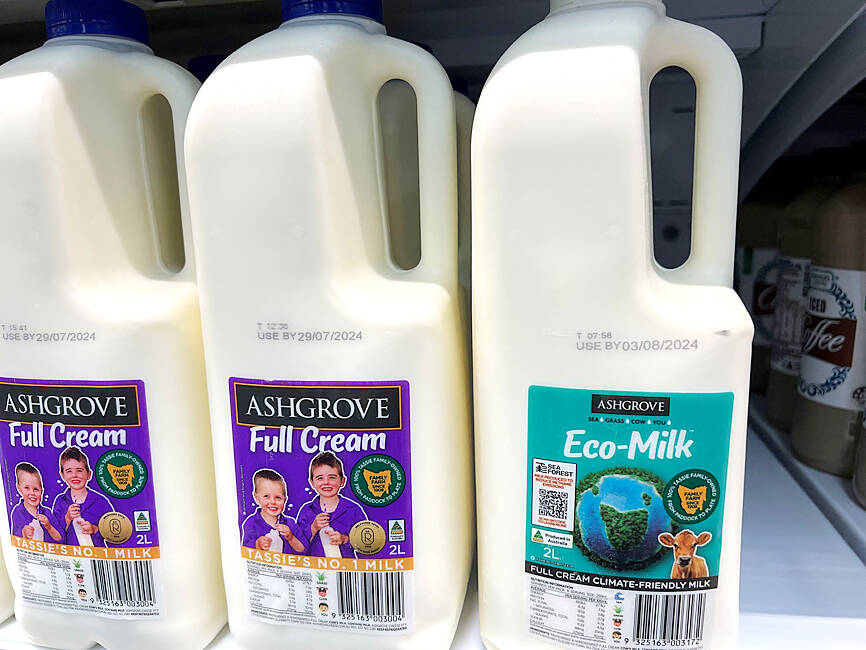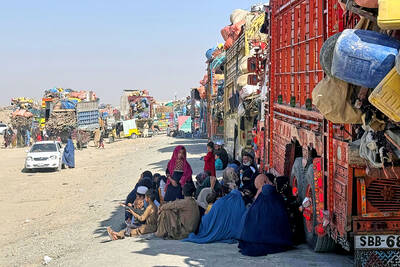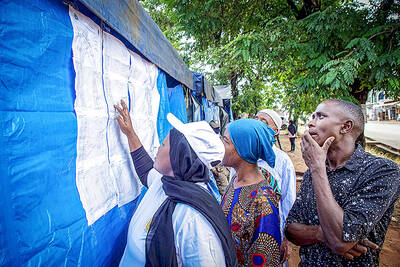A small dairy in Tasmania is stocking supermarket shelves with what it says is the world’s first branded milk produced by cows fed with a seaweed that makes them emit lower levels of environmentally damaging methane gas.
The livestock industry accounts for about 30 percent of global methane emissions, according to the UN.
Seaweed and other feed additives for cattle could reduce these greenhouse gas emissions, but have yet to be widely adopted due to cost.

Photo: Reuters
Since February, family-owned Tasmanian dairy producer Ashgrove has been feeding about 500 cows — a fifth of its total — an oil containing a seaweed extract that reduces the methane released by a cow’s digestion, co-owner Richard Bennett said.
The cows produce about 10,000 liters of milk a day, a portion of which is bottled as “Eco-Milk” and sold across Tasmania, including at Woolworths, Australia’s largest supermarket chain.
“We’re getting about 25 percent reduction in methane,” Bennett said.
Eco-Milk is a test of whether consumers will pay extra for dairy products that have a lower environmental impact.
A 2-liter bottle sells for A$5.50 (US$3.67), A$0.25 more than normal full cream milk, Bennett said, adding that sales were going well, but the company had yet to decide on whether to expand the project.
Producers of feed additives that inhibit the release of methane by microbes digesting plant matter in cows’ stomachs have invested hundreds of millions of dollars to produce enough to feed millions of animals.
French cheese maker Bel Group last year said it would feed an additive to about 10,000 dairy cows in Slovakia. Other firms, including JBS, Danone and Fonterra, have dabbled with additives, but not rolled them out at scale.
The additive used by Ashgrove is supplied by a Tasmanian company called Sea Forest. Its CEO, Sam Elsom, said he hoped Eco-Milk would be popular.
“If these products aren’t supported, things will go back to usual,” he said. “And the pace of decarbonization will be much slower.”

With much pomp and circumstance, Cairo is today to inaugurate the long-awaited Grand Egyptian Museum (GEM), widely presented as the crowning jewel on authorities’ efforts to overhaul the country’s vital tourism industry. With a panoramic view of the Giza pyramids plateau, the museum houses thousands of artifacts spanning more than 5,000 years of Egyptian antiquity at a whopping cost of more than US$1 billion. More than two decades in the making, the ultra-modern museum anticipates 5 million visitors annually, with never-before-seen relics on display. In the run-up to the grand opening, Egyptian media and official statements have hailed the “historic moment,” describing the

‘CHILD PORNOGRAPHY’: The doll on Shein’s Web site measure about 80cm in height, and it was holding a teddy bear in a photo published by a daily newspaper France’s anti-fraud unit on Saturday said it had reported Asian e-commerce giant Shein (希音) for selling what it described as “sex dolls with a childlike appearance.” The French Directorate General for Competition, Consumer Affairs and Fraud Control (DGCCRF) said in a statement that the “description and categorization” of the items on Shein’s Web site “make it difficult to doubt the child pornography nature of the content.” Shortly after the statement, Shein announced that the dolls in question had been withdrawn from its platform and that it had launched an internal inquiry. On its Web site, Le Parisien daily published a

‘NO WORKABLE SOLUTION’: An official said Pakistan engaged in the spirit of peace, but Kabul continued its ‘unabated support to terrorists opposed to Pakistan’ Pakistan yesterday said that negotiations for a lasting truce with Afghanistan had “failed to bring about a workable solution,” warning that it would take steps to protect its people. Pakistan and Afghanistan have been holding negotiations in Istanbul, Turkey, aimed at securing peace after the South Asian neighbors’ deadliest border clashes in years. The violence, which killed more than 70 people and wounded hundreds, erupted following explosions in Kabul on Oct. 9 that the Taliban authorities blamed on Pakistan. “Regrettably, the Afghan side gave no assurances, kept deviating from the core issue and resorted to blame game, deflection and ruses,” Pakistani Minister of

UNCERTAIN TOLLS: Images on social media showed small protests that escalated, with reports of police shooting live rounds as polling stations were targeted Tanzania yesterday was on lockdown with a communications blackout, a day after elections turned into violent chaos with unconfirmed reports of many dead. Tanzanian President Samia Suluhu Hassan had sought to solidify her position and silence criticism within her party in the virtually uncontested polls, with the main challengers either jailed or disqualified. In the run-up, rights groups condemned a “wave of terror” in the east African nation, which has seen a string of high-profile abductions that ramped up in the final days. A heavy security presence on Wednesday failed to deter hundreds protesting in economic hub Dar es Salaam and elsewhere, some